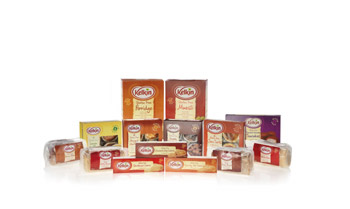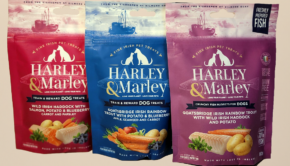Let them eat cake

Ireland has one of the highest rates of coeliac disease in the world, and is therefore likely to follow a similar trajectory to the American gluten-free market, where sales have grown at an annual rate of 28% since 2004
8 July 2009
AT A GLANCE: GLUTEN-FREE
- Irish people have a higher than average risk of coeliac disease
- It is estimated one in 300 Irish people has coeliac disease (source: Vhi Healthcare)
- Research conducted in Northern Ireland in 1998 suggests that as many as one in 122 individuals there have coeliac disease
- Under the new European Commission regulation (EC) No 41/2009, from 1 January, only foods that contain less than 20 parts of gluten in a million will be allowed to use the term ‘gluten-free’
- In the US, sales of gluten-free products are estimated to reach $2.6bn by 2012
- The American gluten-free market has grown at an average annual rate of 28% since 2004, when it was valued at $580m, to reach $1.56bn last year
- Juvela is the leading gluten-free brand in Ireland
- Kelkin Ltd has been providing gluten-free food options for over 30 years, and caters for every occasion
Coeliac disease is more common than most people realise, according to Dr Nick Kennedy of the Department of Clinical Medicine, Trinity College Dublin. Kennedy writes that “screening studies suggest that between one in 200 and one in 300 people of northern European extraction have coeliac disease,” but that “it has been believed for a long time that Irish people have a higher than average risk.” Research conducted in Northern Ireland in 1998 suggests that as many as one in 122 individuals in Ireland have coeliac disease.
Earlier data from Galway (Gumaa et al, 1997) suggests that the incidence of coeliac disease in children is declining, perhaps due to changes in weaning practices, but that the incidence in adults is increasing. This could possibly be attributed to greater awareness and an increasing rate of diagnosis.
According to The Coeliac Society of Ireland however, despite the fact that Ireland has one of the highest incidences of coeliac disease in the world, there can nevertheless be some confusion as to what the coeliac diet involves. There is sometimes a misconception that it is a “problem with wheat flour,” whereas the society states that the diet can actually be “affected by many processed foods, where there may be modified starch, malt extract or cereal fillers.”
Strictly gluten-free
Those who have the condition suffer from “a persistently abnormal immunological reaction to dietary gluten,” which can cause tissue damage to occur. And while medicine or drugs are not needed to treat the disease, sufferers must follow a strict gluten-free diet. This means they can’t eat foods which contain any form of gluten (a particular type of protein) which is found in wheat, barley, rye and oats. Eating gluten causes the lining of the small intestine to become damaged and so reduces the person’s ability to absorb certain foods. However, the extent of someone’s reaction to gluten and the degree of damage it causes is variable between individuals.
Dr Kennedy states that the main foods which coeliacs must avoid “include breads, biscuits, cakes, pastries, pizzas, pasta, sausage meats, spaghetti, certain soups, certain sauces, certain gravies and certain breakfast cereals.” The good news for sufferers however, according to the Coeliac Society, is that “there is reasonably good awareness of the condition throughout the country.” Subsequently the Irish market is well-served in terms of a gluten-free products, with 11 gluten-free manufacturers supplying the category in total. The international standard for gluten-free foods, Codex Alimentarius Commission (CAC), ensures that commercial gluten-free foods are safe for coeliacs to consume.
New Codex guidelines introduced
Under the new European Commission regulation (EC) No 41/2009, the gluten-free guidelines were amended in July last year, to follow a more stringent code. From 1 January, only foods that contain less than 20 parts of gluten per million (ppm) will be allowed to use the term ‘gluten-free’ on their packaging. What’s more, if a product contains a gluten level of 21 to 100ppm, it will have to be labelled as ‘very low gluten,’ by 2012. Previously however, the level of gluten permitted in gluten-free products stood at 200mg gluten/kg or 200ppm. The UK’s Food Standards Agency estimates that the passage to full compliance for the new rules from Europe could necessitate extra costs for manufacturers, in particular in terms of re-labelling, that could reach £1000 per affected product.
However in the UK, as in Ireland, the market for gluten-free still holds out considerable potential. Mintel states the UK market for products catering for consumers with food intolerance and allergies has grown by 165% between 2000 and 2003 alone. Meanwhile in the states, analyst Packaged Facts has estimated that sales of gluten-free products will reach $2.6bn by 2012. The gluten-free market has grown at an average annual rate of 28% since 2004, when it was valued at $580m, to reach $1.56bn last year.
Tasting panel ensures quality
Kelkin has been providing gluten-free food options for over 30 years. The company’s wide selection of tasty speciality products offers consumers and their families a choice for every occasion. Kelkin cereals provide a great start to the day, its breads and crackers are perfect for lunch and its teacakes and muffins make a tasty treat anytime. Kelkin states its expertise and commitment allow the brand to continually develop and improve its gluten-free range for consumers’ enjoyment.
To ensure the company is meeting changing consumers’ demands it has set up a coeliac tasting panel across Ireland. Before launching any new gluten-free product the marketing team collects feedback from the panel to make sure Kelkin’s ever expanding portfolio meets consumer demands in terms of taste, quality and packaging format.
This August will see the launch of the latest addition to the gluten-free range, Kelkin Jaffa Cakes. For further information visit the website www.kelkin.ie or phone 01 4600400.
Jubilation and joy
Juvela is the leading gluten-free brand in Ireland, producing a complete range of gluten-free alternatives to everyday staple foods. The range includes Juvela White and Fibre Sliced Loaves, Juvela White and Fibre Rolls, Tea Biscuits, Digestive Biscuits and Juvela Mix which is suitable for making bread, cakes, biscuits and sauces. This can also be used in breadmakers.
The Juvela range has been developed to ensure that coeliac customers have a gluten-free diet that is varied, well-balanced and enjoyable. In addition to the range of gluten-free foods, Juvela offers a support service to help make life easier for those on a gluten-free diet and includes information leaflets, a recipe service and advice line. Juvela is distributed by SHS Sales & Marketing.
Questions and answers with…
Anne Manning, gluten-free food list manager, Coeliac Society of Ireland
How easy is it for consumers to find gluten-free products in shops?
The major supermarket chains such as Dunnes Stores, Superquinn, Tesco, Supervalu all carry gluten-free dietary items, as well as pharmacies and health shops.
Are coeliacs well catered for by Irish stores?
In general, they are well catered for. However, at times you will find that due to a supply problem, a particular gluten-free dietary item may not be available. Supermarket chains in cities will carry a bigger selection than supermarkets in the smaller towns throughout the country.
Are smaller retailers increasingly stocking gluten-free products also?
Yes, Centra, Mace, Costcutter; more of the smaller supermarkets are stocking a limited supply of gluten-free dietary items.
How could retailers improve their offering for coeliac sufferers?
There is always room for improvement. It can definitely be frustrating if you find that your favourite gluten-free item is not available. There are many gluten-free dietary products available in the UK and Northern Ireland that do not make it onto the market in the Republic. Gluten-free dietary products do have quite a short shelf-life, especially some of the gluten-free fresh breads, and it is pretty obvious that these could cause problems for supermarkets.
However, we would welcome gluten-free dietary items, such as breads, cakes, biscuits, cereals, pasta etc, under an Irish supermarket’s own brand label. Gluten-free products are expensive and anything that would make cheaper but safe gluten-free dietary products available to Irish coeliac consumers would be welcomed.
There is a niche in the retail market for naturally gluten-free flours, such as buckwheat flour, maize meal, quinoa, polenta, millet, potato flour, and soya flour. These are available but very seldom can they be deemed completely free of cross contamination. It would be of huge benefit to coeliacs to have these naturally gluten-free flours and grains available and guaranteed when tested to be less than 20ppm, in line with the new revised codex standard.
Gluten-free beer is now available in Ireland through the off-trade; we would appreciate some of the pubs around the country stocking it. Details on gluten-free beers are available at www.coeliac.ie or by emailing info@coeliac.ie



 Print
Print






Fans 0
Followers